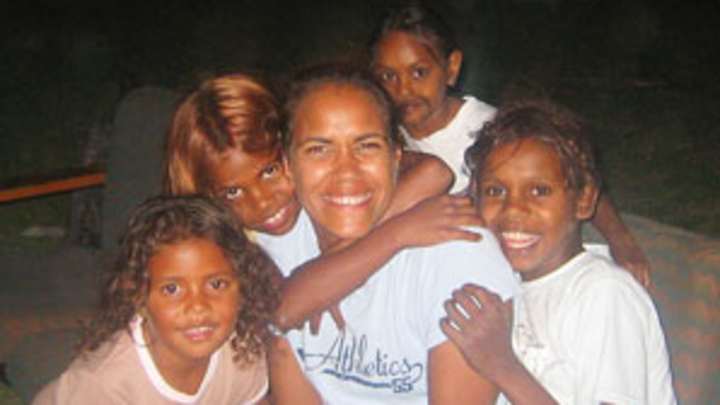Catching Up With Cathy Freeman


As she strode across the shallow pool of water at the center of Sydney's Olympic Stadium, Cathy Freeman had just one thing on her mind: "Oh my God, what if I fall over?"
"I was absolutely panicking," she laughs today, recalling her role as the final torchbearer during the opening ceremonies of the 2000 Summer Games. "The rocks [were] just so far under the water, and I've got to keep balanced holding the torch thing."
Fortunately for Freeman, and for everyone else, she kept her footing. She later created an iconic moment, a symbol of the commitment her country had made toward racial reconciliation. Ten days after the Sydney opening ceremonies, she cemented her place in Olympic and Australian history when she won the women's 400, becoming the first indigenous Australian to medal in an individual event.
"What I saw that night, I could have died and gone to heaven the next morning and I would have felt truly fulfilled," said Freeman, 34. "Not just [because of] what I achieved as an athlete, but what people were actually feeling in their hearts in the stadium that night was just incredible."
That feeling of love for country and countrymen has continued to grow after Freeman's retirement in 2003. For two seasons she co-hosted a Lonely Planet travel series for Australian television called Going Bush, where the self-described "urban indigenous person" road-tripped around rural indigenous Australia. This year she hosted Who Do You Think You Are?, a popular series that traces the genealogies of famous personalities.
Freeman understands that as one of Australia's most beloved public figures, exploring her own heritage means drawing attention to a long-obscured segment of its cultural history. "I've always been curious about my own backyard and my own indigenous culture," she said. "And I've also been really curious about my own history and genealogy, which in turn is a lesson about the history of Australia and the multiculturalism of Australia."
Freeman serves as patron for several national children's charities and recently published an autobiography aimed at young readers. She has also established her own foundation, which has a particular interest in creating educational opportunities for underprivileged youth. While she hopes to expand aid to disadvantaged groups in Australia, her foundation is starting with Palm Island, the tiny and impoverished community where Freeman's mother grew up and for decades was used as a penal settlement for indigenous Australians.
"Because Palm Island is a part of Australia's terrible history between indigenous and non-indigenous people, there's a lot of pain," Freeman said. "The young people are so troubled and feeling so displaced and not quite sure of who they are because of the bad example some of their adults are setting." Freeman's foundation plans to build the island's first public library and give away mountain bikes as incentives for staying in school. She also has plans to set up a scholarship program for Palm Island students.
Freeman, who is engaged to an Australian stockbroker, has come a long way from the young athlete who was proud of her background but mostly focused on her racing career.
"It's been over seven years since that one night in Sydney, and I still sort of find myself really coming to grips with it," Freeman said. "[My friends and family] tell me, 'You've got this voice, use it! You've got this place in people's hearts and minds now.' I'm very grateful, although at the end of the day I did only want one thing, and that's an Olympic gold medal in Sydney. If there's anything else I've achieved beyond sports, in a more social context, then that's wonderful too, and I graciously accept this responsibility."
